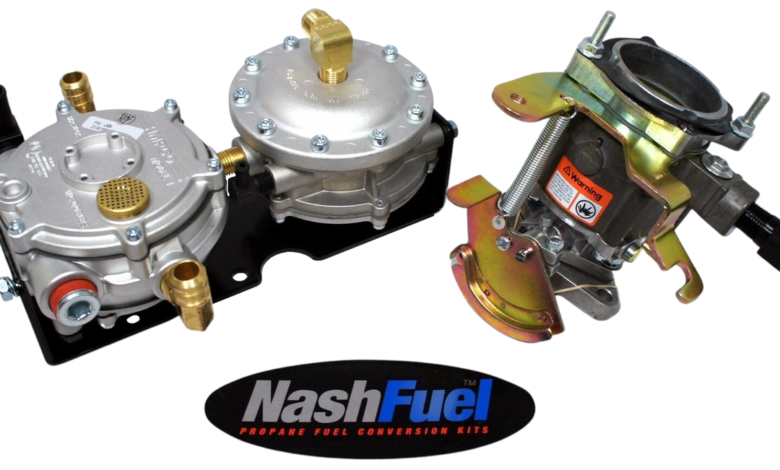Ultimate Guide to the Nissan K24 Propane Carburetor Fuel System
Nissan K24 Propane Carburetor Fuel

Nissan K24 Propane Carburetor Fuel The Nissan K24 engine is renowned for its durability, performance, and versatility. Often found in industrial and automotive applications, this engine has become a popular choice for custom modifications and fuel system conversions. One of the most intriguing adaptations is the conversion from gasoline to propane using a propane carburetor fuel system. This modification not only improves fuel efficiency but also supports environmental sustainability.
In recent years, propane conversions have gained traction due to the rising costs of gasoline and the growing awareness of eco-friendly alternatives. Propane, being a cleaner-burning fuel, presents a viable option for those looking to reduce their carbon footprint without sacrificing engine performance. This guide explores every facet of installing and maintaining a propane carburetor system on the Nissan K24 engine, from its benefits to step-by-step installation instructions.
Whether you’re a seasoned mechanic or an enthusiastic DIYer, this comprehensive guide will walk you through everything you need to know about converting your Nissan K24 engine to run on propane. You’ll discover the components involved, potential performance gains, maintenance requirements, and much more.
Understanding the Basics
The Nissan K24 is a four-cylinder inline engine known for its reliable power output and adaptability. With its strong build quality and widespread availability, it has become a favorite for industrial equipment, utility vehicles, and performance projects alike. Its design allows for various fuel system modifications, making it an ideal candidate for propane conversion.
A propane carburetor fuel system is a type of alternative fuel setup that uses propane gas instead of traditional gasoline. It involves replacing or modifying the engine’s existing fuel delivery system to accommodate propane, typically via a specialized carburetor. Propane enters the engine in a vaporized form, ensuring consistent combustion and reducing engine knock.
One of the key distinctions between propane and gasoline is the combustion process. Propane has a higher octane rating, which can lead to more efficient fuel burning and less residue within the engine. This results in cleaner engine internals, longer service intervals, and overall better engine health over time. Understanding these basics sets the stage for a successful conversion project.
Benefits of Using Propane Fuel
One of the most significant advantages of switching to propane is its environmental benefit. Propane burns cleaner than gasoline, producing fewer carbon emissions and reducing air pollutants like nitrogen oxides and particulate matter. For businesses or individuals focused on sustainability, propane offers a way to maintain engine performance while minimizing environmental impact.
In addition to being eco-friendly, propane is often more cost-effective than gasoline. Although conversion requires an initial investment, the long-term fuel savings typically outweigh these upfront costs. Propane prices are usually more stable than gasoline prices, offering consistent savings for frequent users.
Engine longevity is another major benefit. Propane combusts more cleanly than gasoline, leading to fewer carbon deposits in the engine. This means components like spark plugs, pistons, and valves remain cleaner and last longer. Reduced engine wear translates to lower maintenance costs and fewer unexpected repairs.
Propane Carburetor System Components
The core of any propane fuel system is the carburetor, which mixes air and fuel before it enters the engine’s combustion chamber. In a propane system, a specialized carburetor or a modified version is used to accommodate the characteristics of vaporized propane. This ensures a proper air-to-fuel ratio for optimal engine performance.
Nissan K24 Propane Carburetor Fuel Other crucial components include the mixer, vaporizer, and regulator. The mixer blends propane with incoming air, the vaporizer converts liquid propane into vapor, and the regulator controls fuel pressure and flow. These parts work together to deliver a steady supply of fuel, ensuring consistent engine operation.
The propane tank is another vital element. Available in various sizes, these tanks come equipped with safety valves, level indicators, and mounting brackets. Proper installation and regular inspection of these tanks are essential to maintaining system integrity. Fuel lines connect all components, and their quality and routing are critical for safety and efficiency.
Propane Conversion Process for Nissan K24
Choosing the right conversion kit is the first step in the conversion process. These kits are available from various manufacturers and typically include the carburetor, vaporizer, regulator, mixer, fuel lines, fittings, and tank mounting hardware. It’s essential to select a kit compatible with the K24 engine to ensure a smooth installation.
Installation involves several steps, starting with the removal of the existing gasoline components. Next, the new carburetor is installed along with the mixer and vaporizer. The propane tank is then mounted securely, and fuel lines are connected to each system component. Electrical connections for sensors and safety shut-offs may also be required, depending on the setup.
Once the installation is complete, tuning the carburetor is necessary to achieve the best performance. This involves adjusting the fuel-air mixture and idle speed. Finally, a thorough inspection and testing phase ensures all components are functioning correctly. It’s advisable to conduct leak tests and monitor engine behavior during initial operation.
Performance Metrics and Efficiency
Propane has a slightly lower energy content per unit volume compared to gasoline, which may result in a small decrease in horsepower. However, the higher octane rating of propane can improve engine efficiency and reduce knocking, offsetting some of this loss. For many users, the trade-off is minimal, especially when considering the benefits of cleaner combustion and longer engine life.
Fuel efficiency, often measured in miles per gallon (MPG) or runtime per tank, can be comparable to gasoline depending on engine tuning and load conditions. With proper carburetor adjustments, a propane-fueled K24 engine can deliver consistent and reliable performance in various applications.
Cold weather performance is another critical factor. Propane systems can struggle in low temperatures without proper heating elements or insulation. However, modern conversion kits often include features to mitigate cold start issues, ensuring reliable engine operation year-round.
Compatibility and Use Cases
The Nissan K24 engine is used in a wide range of vehicles and equipment, including forklifts, compact trucks, off-road vehicles, and generators. Its robust design and flexibility make it suitable for both mobile and stationary applications. Converting to propane can extend its use in environmentally sensitive or indoor environments.
Industrial applications are particularly well-suited for propane conversions. Warehouses and factories often use propane-powered forklifts due to their clean emissions and indoor safety. Similarly, propane-converted generators provide a dependable power source for remote or off-grid locations.
Off-grid adventurers and remote job sites benefit greatly from propane engines. The ability to store and transport propane easily makes it a practical choice for those needing dependable power in locations where gasoline may be scarce or expensive.
Maintenance and Safety Tips
Routine inspection is critical for a propane fuel system. Components such as hoses, fittings, and valves should be checked regularly for wear and leaks. Cleanliness is also important—dirt or oil can clog injectors or lines and affect performance.
Common issues include low fuel pressure, hard starts, and inconsistent idling. These can often be resolved through simple adjustments or part replacements. Keeping a diagnostic checklist helps identify problems early and maintain optimal engine performance.
Safety is paramount when working with propane. Ensure all components are rated for propane use and installed by qualified personnel. Leak detection systems and shut-off valves add extra layers of protection. Always store and handle propane tanks according to manufacturer guidelines.
Legal and Environmental Considerations
Different regions have specific regulations regarding propane fuel systems, especially in public vehicles or commercial fleets. It’s crucial to understand local emission standards and ensure that the conversion complies with these laws.
Converted engines may require certification to confirm they meet environmental standards. Documentation and inspection reports may be necessary for registration or operation in regulated environments.
Insurance providers may also require proof of compliance for coverage. Ensuring your system is installed professionally and certified reduces legal and financial risks while improving overall safety.
Aftermarket Upgrades and Modifications
Upgrading the carburetor can improve fuel flow and throttle response, particularly in performance applications. High-flow models are available for those seeking to enhance power output without sacrificing reliability.
Nissan K24 Propane Carburetor Fuel Advanced ignition systems tailored for propane can also boost performance. These systems improve spark timing and combustion efficiency, resulting in better engine response and smoother operation.
ECU tuning and integration of sensors like lambda or O2 sensors can provide real-time feedback and adjustments. This enhances fuel economy, reduces emissions, and allows for more precise control over engine parameters.
Troubleshooting Common Problems
Engine stalling can be caused by improper air-fuel ratios or a faulty vaporizer. Regular tuning and component checks help prevent such issues. Ensuring consistent fuel flow and clean connections is essential.
Poor fuel economy may result from a misadjusted carburetor or vacuum leaks. Routine maintenance, including spark plug inspections and regulator calibration, can restore efficiency.
Propane leaks pose significant hazards. Use soap solution or electronic detectors to identify leaks. Always address leaks immediately and avoid open flames or sparks near the engine during inspections.
Comparing Propane Carburetor vs EFI Systems
Carbureted propane systems are simpler and often more affordable than electronic fuel injection (EFI) systems. They require fewer sensors and less wiring, making them ideal for DIY installations.
EFI systems offer better precision and adaptability, especially under varying load and environmental conditions. However, they are more complex and expensive to install and maintain.
Long-term reliability is a key consideration. While both systems can be durable, carburetors are easier to repair and replace in the field, making them a preferred choice for rugged applications.
Case Studies and Real-World Builds
One notable example involves a custom off-road buggy using a K24 engine with a propane carburetor system. The build focused on reliability and fuel availability in remote areas. The owner reported cleaner engine internals and reduced maintenance over hundreds of hours of operation.
Another case study features a warehouse fleet that converted all its forklifts to propane-powered K24 engines. The switch resulted in lower emissions, easier fuel logistics, and significant cost savings over time.
DIY enthusiasts have also embraced propane conversions for their versatility and simplicity. Blogs and forums are full of success stories from users who achieved impressive results with minimal investment.
Tools and Equipment Required
Essential tools include wrenches, screwdrivers, and fuel-safe hoses. A torque wrench ensures proper fitting tightness. Specialized tools like vacuum gauges and leak detectors help fine-tune the system.
Diagnostic tools, such as propane pressure gauges and multimeters, are crucial for troubleshooting. Keeping these on hand reduces downtime and improves system reliability.
When choosing equipment, consider reputable brands known for quality and compatibility with propane systems. Investing in high-grade components ensures safety and performance.
Where to Buy Propane Conversion Kits
Online retailers such as eBay, Amazon, and specialized auto parts stores offer a wide range of conversion kits. Always check compatibility with the Nissan K24 engine before purchasing.
Local distributors may provide added support, including installation services or technical guidance. Visiting a local supplier also allows for direct inspection of kit components.
Look for kits with comprehensive warranties, clear instructions, and positive user reviews. Avoid generic or unbranded kits that may lack quality control or customer support.
Expert Tips and Best Practices
Nissan K24 Propane Carburetor Fuel Avoid common mistakes like over-tightening fittings or using incompatible parts. Refer to manufacturer guides and consult experts when in doubt.
Tuning is essential for optimal performance. Use proper tools and take your time adjusting fuel mixture and idle settings. A well-tuned system provides smoother operation and better fuel efficiency.
Regularly document maintenance and system changes. This helps track performance over time and simplifies troubleshooting. Keeping spare parts on hand can also minimize downtime.
Cost Analysis
Initial conversion costs typically range from $600 to $1,500, depending on kit quality and installation complexity. This includes the cost of components, tools, and labor if outsourced.
Over time, propane’s lower cost can result in significant savings, particularly for high-usage applications. Users report up to 40% savings on fuel costs compared to gasoline.
A cost-benefit analysis over five years often shows a clear return on investment. Reduced maintenance, longer engine life, and lower fuel costs make propane an economically sound choice.
Community and Support
Online forums like Reddit, specialized Facebook groups, and automotive communities provide a wealth of information. These platforms offer troubleshooting tips, product reviews, and modification ideas.
YouTube channels featuring propane conversions can guide users through installations step-by-step. Watching real-world builds builds confidence and ensures better outcomes.
Joining propane user associations or local car clubs opens up networking opportunities. Sharing experiences and learning from others enhances the ownership and conversion experience.
Future of Propane Fuel Systems
Technological advances continue to improve propane fuel systems. Innovations include smart regulators, hybrid fuel compatibility, and automated tuning systems.
Hybrid setups that combine propane with electric power or gasoline backup are gaining interest. These systems offer extended range and increased flexibility for different driving conditions.
As regulations tighten and sustainability becomes a priority, propane’s role in clean transportation is likely to grow. It offers a practical middle ground between fossil fuels and fully electric vehicles.
Conclusion
The Nissan K24 propane carburetor fuel system is a practical, efficient, and environmentally responsible solution for a variety of applications. From off-road adventures to industrial workhorses, the benefits of propane extend far beyond fuel savings. Cleaner emissions, longer engine life, and lower maintenance make it an attractive option for those seeking a reliable alternative to gasoline.
Whether you’re converting for economic, environmental, or performance reasons, understanding the process and components is key to a successful project. With proper planning and execution, your propane-powered K24 can deliver years of dependable service.
FAQs
- Can a Nissan K24 engine run entirely on propane?
Yes, with a complete propane conversion kit, the K24 can operate solely on propane. - Is a propane carburetor better than EFI?
Carburetors are simpler and easier to maintain, while EFI offers better precision and adaptability. - How long does installation take?
Depending on skill level, a full installation can take 4 to 8 hours. - Will converting void my warranty?
In many cases, yes. Always check with the manufacturer or dealer. - How safe is a propane system?
When installed correctly, propane systems are very safe. Use certified components and follow safety protocols. - Can I switch back to gasoline?
Yes, if a dual-fuel system is installed or the propane system is removed. - Does propane affect engine power?
There may be a slight drop in power, but tuning can help minimize this. - Where do I refill propane tanks?
At most gas stations, hardware stores, or dedicated propane suppliers. - Is propane good in cold weather?
With proper components, propane performs well in winter conditions. - What’s the lifespan of a propane-converted engine?
Typically longer than gasoline engines due to cleaner combustion.

